State budgetary educational institution
vocational school No. 000
Research work on the topic:
"What's in a name?
The origin of Russian personal names "
2012
Table of contents
1. Introduction ……………………………………………………………………………… ..3
2. The science of proper names ………………………………………………… ..4
3. Periodization of the history of names ……………………………………………………… 4
3.1. Pre-Christian period …………………………………………………………… 5
3.2. The period after the baptism of Russia ……………………………………………………… ... 5
3.3. The period after the October Socialist Revolution ………………… .7
3.4. Modern onomastics ……………………………………………………… ..8
4. A research analysis of modern onomastics using the example of names in the SBEI NPO No. 000 of the city of Orekhovo-Zuyevo ……………………………………… .11
5. Conclusion ………………………………………………… ... 13
6. Bibliography ………………………………………………… ... 14
1. Introduction
The great ancient Greek poet Homer wrote in the poem Odyssey:
No one is nameless between two living people
Not at all; at the moment of birth, everyone, both low and noble,
He receives his name from his parents as a gift ...
This means that all peoples have always had names, at all times, but of course, they were not like our names today. But the name is very important for a person. It is this combination of surname and patronymic that distinguishes us from other people and identifies us. We all have a different attitude to our name: most enjoy the sound of their name. It is no coincidence that psychologists advise in order to attract an interlocutor, often call him by name. Sometimes a person does not like his name, and then life is poisoned by eternal discontent with himself and others, because they often pronounce his name. Astrologers believe that the name given at birth affects the fate of a person.
The history of names, in my opinion, is very interesting. After all, it is related not only to the history of the language, but also reflects the history of the country.
The purpose of this research work: studying the history of the appearance and periodization of changes in a personal name in the Russian nominal formula.
Research objectives:
- characterize the science of the study of proper names; to analyze the history of the appearance of a personal name in the Russian nominal formula; to study the periodization of changes that have occurred with personal names throughout their existence.
Object of study in the work are the data of historical and modern onomastics.
Subject of study: female and male names of students SBEI NGO No. 000 of the city of Orekhovo-Zuevo.
Hypothesis: proper names vividly respond to changes in society, so names can carry all kinds of information about the social phenomena of their time.
Basic methods and techniques: work with scientific literature, statistics, analysis of female and male names of students SBEI NGO No. 000 of the city of Orekhovo-Zuevo.
2. The science of proper nouns.
The science of proper names is called onomastics. This term is associated with the Greek word onoma - name. The names of people are part of the history of peoples. They reflect everyday life, beliefs, aspirations, imagination and artistic creation of peoples, their historical contacts. People began to perceive any word by which a person was called as his personal name, and, therefore, any word could become a name. Thus, a personal name is a special word that serves to designate an individual person and is given to him individually in order to be able to contact him, as well as talk about him with others.
Onomastics includes historical, geographical, ethnographic, cultural, sociological, literary components that help to identify the specifics of named objects and traditions associated with their names, which makes onomastics an autonomous discipline that uses mainly linguistic methods, closely related to the complex of humanities, as well as sciences about Earth and the universe.
Proper names vividly respond to changes in nature and society, therefore proper names can serve as chronologizers of texts, as well as historical and archaeological sites. Due to the special conservatism of proper names, they survive the epoch in which they were created, preserving evidence of a more ancient state of the language, and contain large linguistic and extralinguistic information that can be obtained only by linguistic methods.
All the diversity of the world of things constitutes the primary basis for names - common nouns as generalizing similar facts and proper as singling out individual objects in a series named using common nouns.
3. Name History Periodization
Three stages are distinguished in the history of Russian personal names.
1. The pre-Christian stage, in which distinctive names were created, created on East Slavic soil by means of the Old Russian language.
2. The period after the baptism of Russia, when the church, along with Christian religious rites, brought in foreign names borrowed by the Byzantine church from different peoples of antiquity.
3. A new stage, which began after the Great October Socialist Revolution and was marked by the penetration of a large number of borrowed names into the Russian name-list and active property-making.
3.1. Pre-Christian period
In Old Russian, the proper name that calls a person had the name Reklo, nickname, nickname, name, nickname, name.
In the pre-Christian period, Russians had names reflecting various properties and qualities of people, their physical disabilities, and features of speech. There were also names reflecting the order of the appearance of children in the family and the attitude of parents to them. All these characteristics could be expressed in names both with the help of corresponding common nouns, and figuratively, through comparisons with plants, animals. Such a comparison can be noted in the names Wolf, Cat, Sparrow, Peas, Birch.
Thus, before the introduction of Christianity in Russia, personal names were nothing more than nicknames given for one reason or another. Indeed, in ancient times, people perceived names materially, as an integral part of man. They hid their names from enemies, believing that just knowing the name is enough to harm someone.
Old Russian names-nicknames are of great interest. They reveal the richness of the Russian folk language.
Old Russian nicknames were diverse. Names were assigned according to external signs: growth, physique. So the names Chernysh, Belyak, Belaya are given by color of hair, skin. Names could be given by character - Buyan
Some of the names reflected the time of the appearance of the child. For example: Pervak, First, Second, Second, Tretiak (this name was one of the most common), Third, Big, Small. Today we meet the direct descendants of these names in the names: Pervov, Tretyak or Tretyakov, Bolshov, etc.
Many nicknames were given on individual occasions and occasions, for example, could reflect the attitude of parents to the appearance of the child: Zhdan, Nezhdan. Among the old Russian names were those that have survived to our days - Vadim, Vsevolod, Lyubava (now Love).
3.2. The period after the baptism of Rus
With the introduction of Christianity in Russia, all names of this type were supplanted by church names that came to us from Byzantium. Among them, in addition to proper Greek names, there were ancient Roman, Hebrew, Syrian, Egyptian names, each of which in its own language had some meaning, but when borrowed into another language it was used only as a proper name, and not as a word indicating that or else. So, in its time Byzantium collected the best names of its own language and the languages \u200b\u200bof neighboring countries and canonized them, that is, it legally legalized, making them church names.
After the introduction of Christianity in Russia, the so-called calendar or church names came into practice. They became an integral part of the Russian language, part of the history of the Russian people. We now call them calendar conditionally, since throughout their entire existence they were given to people according to church calendars. The official confession of Christianity in Russia began in the 10th century. In the reign of Vladimir Svyatoslavich, Christianity became the state religion. Prince of Kiev of Kiev, looking for a strong ally, made an alliance with Byzantium. One of the conditions of this union was the adoption by Russia of the Christian religion. In 988, Vladimir was baptized himself and began to introduce a new religion in Russia.
When baptized, Prince Vladimir Svyatoslavich was given the name Vasily, Princess Olga - Elena (957). The sons of Vladimir Svyatoslavich - Boris and Gleb, respectively, received the names - Roman and David. Prince Vsevolod - Gabriel. Great-grandson of Vladimir Monomakh - Mstislav Rostislavovich received the name George.
The Christianization of the population of Russia and the mandatory rite of baptism required the names of people with new Christian names. The adoption of new names by the Russian population was slow.
Transferred to Russian soil, these names did not immediately supplant the old names. The gradual entry of these names into Russian life is evidenced by at least the fact that until the 17th century, Russians, along with Christian names given by the church, were called more understandable to them worldly names, which gradually became nicknames. Therefore, in ancient chronicles, books, letters, such complex names of people are often found such as “Boyar Theodor, Call of the Road”, “Fedot Ofonasiev son, nickname Cucumber”, “Ostashko, nickname Pervushka”, “Alexey, nickname Budila, Semenov son”.
By the XVIII-XIX centuries. Old Russian names were already completely forgotten, and Christian names to a large extent changed their appearance, adapting to the peculiarities of Russian pronunciation, inflection and word formation. So, the name of Aquilin in the Russian language took the form of Akulin, Diomede - Demid, Jeremiah - Yeremey, Ioannikiy - Anikei, etc. A number of names until recently were used in two versions: church, standing closer to the Greek original, and civil, folk, more adapted to Russian pronunciation. Compare: Sergius and Sergey, Agipiy and Agap, Elijah and Ilya, Zachary (Zachariah) and Zakhar. On the other hand, some names, along with the accepted civil, literary form, received in oral speech such a form that can not be recommended: Arsentius instead of Arseny, Avdotya instead of Eudokia, Afrosinya instead of Euphrosyne.
At baptism, the name of the child was recorded in the registration book (such books were kept in all churches), and usually the spelling of that calendar or some other liturgical book that was available in this church was usually followed. Upon receipt of a metric or birth certificate (and they were not issued by the church, but by special civilian institutions - in the cities of the Consistory, in the villages of the volost clerk) the name was not written letter by letter, but most often as requested by the parents or as the clerk considered it necessary. Serious legal significance was not given to the discrepancy between the entries in the church book and the metric; the main option was the church anyway, and the spelling of the name could be additionally checked by the date of birth of the angel named and the day of the angel correlated with it.
Since earlier documents (passport, metric, certificate, record of baptism, etc.) included different variants of names (both in church and in their secular form), all of them can be called passport, official, documentary, despite a number of spelling and pronounced differences. In popular dialects, many names underwent significant alterations (Evdokia - Evdokia - Avdotya through the unstable version of Avdokya), but since these forms also got into documentary records, they also have to be considered official.
3.3. The period after the October Socialist Revolution
After the Great October Socialist Revolution, when complete freedom in the choice of names was presented, a new name-making developed, especially in cities where, on the one hand, due to anti-religious sentiment, and on the other hand, it’s too easy to name a child because of the “ village ", abandoned many good Russian names, inventing their own. These were the names associated with the new ideology: Revmira (revolution of the world), Diamara (dialectical materialism); names reflecting the first stages of industrialization: Elektrina, Elevator, Diesel, Ram, (revolution, electrification, mechanization); names subtracted in foreign novels: Alfred, Rudolph; names by names of flowers: Lily, Astra. However, this fashion quickly passed, since most of the new names turned out to be just as alien to the Russian language as many old names that were in the Saints, but were almost never used.
The name should first of all be familiar, consonant with the bulk of the names that are in live use, but most of the new names - names by subject, abbreviations, foreign names - did not take root precisely because of their unusualness, inconsistency with traditional names, because for too bright objectivity. The very few of the new names that have established themselves in public practice resemble in their structure names with a centuries-old tradition.
And so, starting from the 30s, countless Masha, Sasha, Seryozha again appeared, that is, the names closest to the Russian people, well mastered by the Russian language, again became common. However, this return to the old names does not mean a return to the entire list of names church calendar, more than two-thirds of which have remained alien to the Russian people. On the contrary, the number of old names that people love is so limited that, judging by the numerous letters, poor Sasha and Seryozha already have to be called by surnames in the manger. On the other hand, many good names have been undeservedly forgotten. As a result of all this, the number of names that are currently being given to newborns is more and more reduced.
3.4. Modern onomastics
Modern onomastics is a living phenomenon and is characterized by constant changes. In the 1990s and 2000s, a return and a significant increase in the frequency of some traditional calendar names were recorded, which for almost the entire 20th century were included in the category of rare Anastasia, Daria, Elizaveta, Ksenia, Sofya, Ulyana. However, the turn of the XX-XXI centuries was characterized not only by the preservation of the above trends, but also by a change in the composition of names of mass and wide distribution.
Two statistical tables of the frequency of use of names make it possible to trace the changes that have taken place in the Russian name-book over the past hundred years. They provide information about the most used names in Moscow during the XX century and at the beginning of the XXI. The first table is compiled according to the information collected by A. Ya. Shaykevich (for 1900-1959) and V. A. Nikonov. The second presents data for Moscow for 2006-2008.
1900-1909 | 1924-1932 | 1950-1959 | 1978-1981 |
|||||
Names | Names | Names | Names | |||||
Maria | Valentine | Helena | Helena | |||||
Anna | Galina | Tatyana | Natalya | |||||
Alexandra | Tamara | Natalya | Olga | |||||
Catherine | Lydia | Irina | Anna | |||||
Claudia | Vera | Olga | Yulia | |||||
Tatyana | Lyudmila | Galina | Irina | |||||
Vera | Zinaida | Lyudmila | Maria | |||||
Elizabeth | Hope | Hope | Tatyana | |||||
Helena | Tatyana | Love | Svetlana | |||||
Evdokia | Helena | Svetlana | Catherine |
7 most frequent names of newborns in Moscow in 2006-2008 |
||
Female names |
||
Anastasia | Anastasia | Anastasia |
Maria | Maria | Maria |
Daria | Daria | Daria |
Anna | Anna | Anna |
Elizabeth | Elizabeth | Elizabeth |
Pauline | Victoria | Pauline |
Catherine | Catherine | Victoria |
10 most frequent names of newborns in Moscow in the XX century |
||||||||
1900-1909 | 1924-1932 | 1950-1959 | 1978-1981 |
|||||
Names | Names | Names | Names | |||||
Nikolay | Vladimir | Alexander | Alexander | |||||
Alexander | Victor | Sergei | Sergei | |||||
Michael | Yuri | Vladimir | Alexei | |||||
Ivan | Anatoly | Andrew | Dmitriy | |||||
Vasiliy | Nikolay | Michael | Andrew | |||||
Alexei | Alexander | Victor | Michael | |||||
Sergei | Boris | Alexei | Evgeny | |||||
Vladimir | Evgeny | Igor | Denis | |||||
Peter | Valentine | Valery | Paul | |||||
George | Alexei | Anatoly | Ilya |
Based on these studies, he concludes: “The name is gaining popularity in the high social group, then lower groups borrow this name, its frequency in the population increases, and its social specificity decreases at the same time. When a name concentrates predominantly in low social groups, it begins to fall in the higher social group (breaking point). Gradually, the fall in popularity spreads down until the name becomes rare. After a period of time, it has a chance to be reborn in the higher group again. ”
The use of abbreviations in the language can also be attributed to the peculiarities of use. Nowadays, abbreviated forms of names are very common. Abbreviated forms are used in a variety of situations, with the exception of official ones, in affectionate forms: Maria (Marya) - Maryushka, Mashenka; Love - Lyubonka, Lyubasha, Lyubochka. Abbreviated names are so short that they often turn out to be consonant with several full names, and vice versa, several abbreviations can correspond to one full name. For instance:
Agrafena - Agasha - Gasha - Grania-Grunya-Pear-Fenya
Alexander (a) -Ara, Arya, Alya, Alik, Ksana, Ksanya, Aleksanya, Alex, Aleksasha, Sasha, Sashura, Shura, Sanya, Sanyura, Nyura, Sanyusha, Nyusha.
Anastasia - Nastasya, Natya, Asya, Stasya, Tasya
Such a variety of forms of one name was even reflected in the poem by I. Snegova:
In informal situations - at home, in a circle of friends - people are called informal abbreviated forms of names. They have developed in everyday life for everyday use, since full names are sometimes cumbersome and uncomfortable when communicating in the family, and especially among children and adolescents. (Catherine - Katya, Maria - Masha).
And today, rare names continue to be found, which, as in the post-revolutionary years, are clearly sometimes strange and sometimes comical. The registry office of the city of Pavlovsk, Voronezh region issued a birth certificate to a girl named Russia Kitsenko. It is noteworthy that this is not the first Russian woman named Russia: her namesake is growing in Nizhny Tagil - seven-year-old Russia Shramkova.
Apparently, the Nizhny Tagil people are very funny. One married couple from Nizhny Tagil called their daughter Privatization, another named her son Prahlada, writes. By the way, there is no typo in the last name: Prahlada in Sanskrit means "spiritual bliss", and in such a simple way, parents tried to provide their son with a happy future.
4. Research analysis of modern onomastics using the example of names in the SBEI NGO lyceum No. 000
Studying the question of the origin and use of names in Russian, it seemed interesting to me to study the composition of the names of students of our lyceum. So far I have focused on the analysis of only female names. In our lyceum, 211 girls are studying. It turned out that they carry 46 different names.
An analysis of male names in our lyceum was also conducted. In the list of students of the lyceum there were 130 young men, they have 44 different names. If we talk about the percentage, the variety of male names is slightly higher. Although, according to researchers, the number of names used by girls has always been higher than the number of names of boys. In Kostroma, in 1930, 139 names were used for girls, and 100 for boys, in Leningrad in the 60s, 72 names were used for boys and 74 girls (for every 1,000 names), in 1988 the number of names was 96 for boys and 105 for girls.
Perhaps this discrepancy is due to the appearance in Russian of the names of migrants from the former Soviet republics, reflecting the extensive migration processes.
Number of names |
||
Catherine | ||
Anastasia | ||
Svetlana | ||
Elena, Marina |
The studies of scientists given in the tables above show that in the 90s, Anastasia, Ekaterina, and Anna were among the ten most popular names. But in our list, these names took a higher line. There were only 4 Mari, but Marin was almost twice as much - 7. The name Daria in our Lyceum also turned out to be quite popular and took the ninth line. Pauline is found in the singular, but Elizabeth was not at all. The rather frequent name Elena in our lyceum was not included in the list of frequency ones in the 2000s. The list of rare names of our girls includes 21 names: Vlad, Raisa, Regina, Laura, Aneta, Guzal, Snejana, Angelina, Barbara, Polina, Marianna, Larisa, Dina, Nelya, Oksana, Lilia, Gulnara, Karina, Alina, Claudia, Alesia. These names reflect the modern process of population migration: the eastern names of Guzal, Gulnara are not characteristic of our language. The influence of Western culture is emphasized by the names of Laura, Marianne, who probably appeared under the influence of the series “The Rich also Cry,” Claudia, also reflecting the passion for Western culture in the 90s.
But what kind of data did we get when researching male names. Our list contains 44 names: Anton, Alexey, Alexander, Albert, Artem, Arthur, Andrey, Ali, Valery, Victor, Vladislav, Vladimir, Vyacheslav, Gennady, Dmitry, Denis, Eugene, Egor, Ivan, Ilya, Ion, Konstantin , Maxim, Mikhail, Magamed, Nikolay, Nikita, Nugzar, Oleg, Peter, Pavel, Roman, Renat, Sergey, Stanislav, Stepan, Farhad, Eduard, Elmir, Edward, Ernest, Eldar, Yuri, Yan. In the singular there are 19 names: Ali, Valery, Victor, Vladimir, Gennady, Egor, Ion, Konstantin, Magamed, Nugzar, Peter, Renat, Stepan, Farhad, Elmir, Edward, Ernest, Eldar, Jan. Among them are the Moldovan name Ion, the Muslim, Ossetian name Ali, the Arabic name Magamed, the Georgian name Nugzar, Persian, entrenched in the Muslim environment - Farhad, ancient Greek, entrenched among the Volga Tatars and Bashkirs - Renat. Such diversity reflects not only migration processes, but also the increasing influence of Muslim culture.
The most common were Alexander (13), Sergey (7), Dmitry (7), Maxim (7), Yuri (6), Artem (6), Andrey (6), Nikita (6), Eugene (5). The names Alexander, Sergey, Dmitry, Andrey, Eugene have long occupied a leading position. But the names Maxim, Nikita, Artem, Yuri became more common in the last decade of the XX century.
5. Conclusion
After studying the history of the origin of Russian names and analyzing the names of our lyceum, we came to the conclusion that proper names react vividly to changes in society, so they can serve as a source of information about the state of society in a given historical period. But a personal name, first of all, is an integral part of a person’s life, and therefore everyone should know the history of his origin and treat him with due respect, as his historical roots. "Russian language! For millennia the people created this flexible, magnificent, inexhaustibly rich, smart, poetic and labor tool of their social life; his thoughts, his feelings, his hopes, his anger, his great future, ”- wrote the great writer about Russian. A personal name is part of this rich and diverse language. My work is aimed at increasing interest in the native language, its history, as well as increasing its role in human life.
Bibliography
1. . From the history of Russian names and surnames. Moscow. Education. 1975.
2.,. About Russian names. Lenizdat. 1991.
3.. Russian names and surnames. Veche. Our traditions. 2005.
4. Your name. Brief dictionary of Russian names. Moscow. 1991.
5. Kondratov A. Land of people - the land of languages. Children's literature. 1974.
6. Porudominsky V. Life and word. Moscow. The Young Guard. 1985.
7. Shchetinin. Names Things. Publishing House of Rostov University. 1966.
8. http: // ru. wikipedia. org / wiki
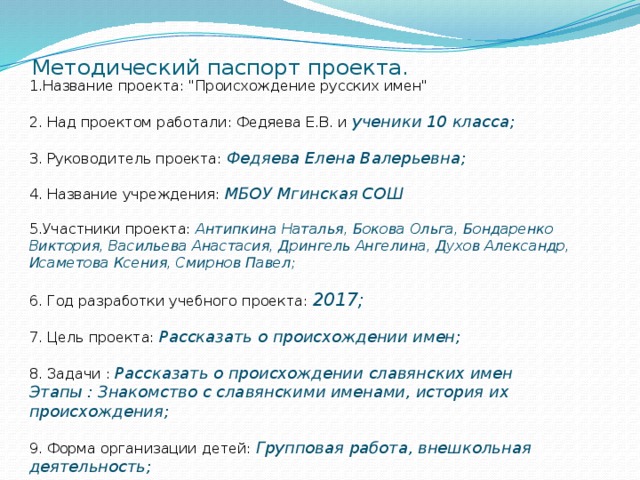
Methodical passport of the project.
1. The name of the project: "The origin of Russian names"
2. Worked on the project: Fedyaeva EV and students in grade 10;
3. Project manager: Fedyaeva Elena Valerievna;
4. Name of institution: MBOU Mginskaya secondary school
5. Project participants: Antipkina Natalia, Bokova Olga, Bondarenko Victoria, Vasiliev Anastasia, Ringel Angelina, Spirits Alexander, Isametova Ksenia, Smirnov Pavel;
6. Year of development of the training project: 2017;
7. The purpose of the project: Tell about the origin of the names;
8. Tasks: Tell about the origin of Slavic names
Stages: Acquaintance with Slavic names, the history of their origin;
9. Form of organization of children: Group work, extracurricular activities;
10. Used technologies: Multimedia, Internet, scientific and historical literature;
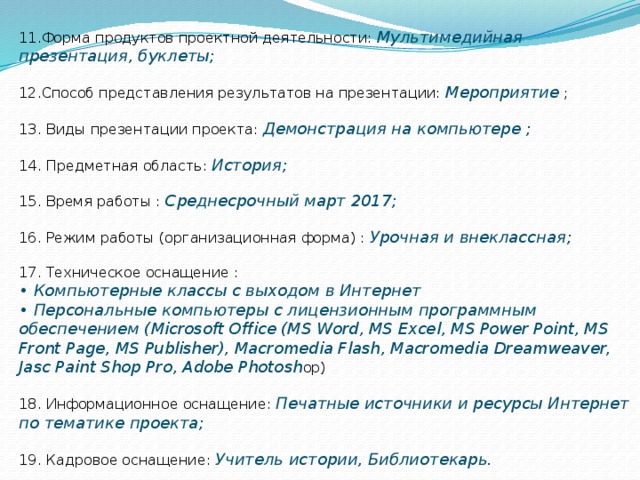
11.Form of products of design activity: Multimedia presentation, booklets;
12. The method of presenting results at a presentation: Event ;
13. Types of project presentation: Demonstration on the computer;
14. Subject area: History;
15. Work time: Mid-term March 2017;
16. Operating mode (organizational form): Lesson and extracurricular;
17. Technical equipment:
Computer classes with Internet access
Personal computers with licensed software (Microsoft Office (MS Word, MS Excel, MS Power Point, MS Front Page, MS Publisher), Macromedia Flash, Macromedia Dreamweaver, Jasc Paint Shop Pro, Adobe Photosh op)
18. Information equipment: Printed sources and Internet resources on the subject of the project;
19. Personnel equipment: History teacher, librarian.
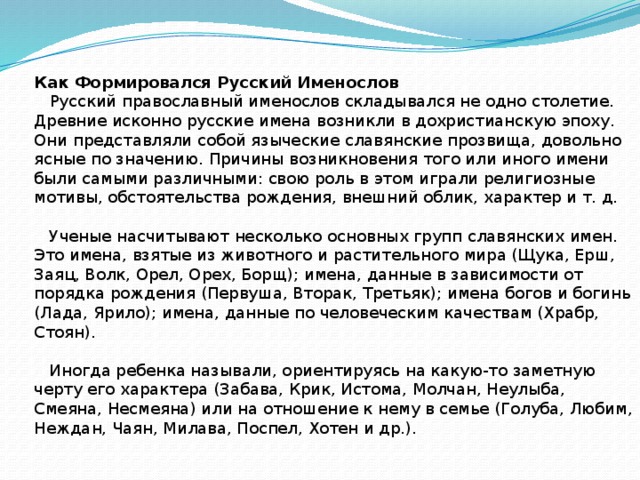
How the Russian Name Dictionary Was formed
The Russian Orthodox naming dictionary has evolved over several centuries. Ancient native Russian names arose in the pre-Christian era. They were pagan Slavic nicknames, quite clear in meaning. The reasons for the emergence of a particular name were very different: religious motives, circumstances of birth, appearance, character, etc. played a role in this. Scientists include several main groups of Slavic names. These are names taken from the animal and plant world (Pike, Ruff, Hare, Wolf, Eagle, Walnut, Borsch); names, data depending on the order of birth (Pervush, Vtorak, Tretiak); names of gods and goddesses (Lada, Yarilo); names given by human qualities (Brave, Stoyan). Sometimes a child was called, focusing on some noticeable trait of his character (Fun, Scream, Istom, Molchan, Neulyba, Smeyan, Nesmeyan) or on his attitude to him in the family (Goluba, Lyubim, Nezhdan, Chayan, Milava, Ripen, Hoten and other).
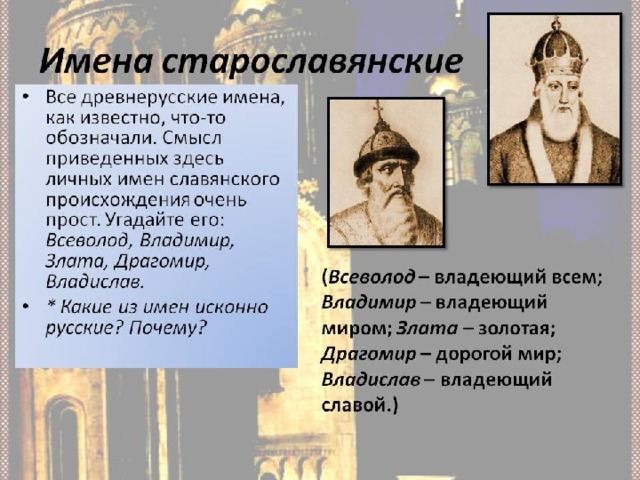
Slavic names were supplemented by several Scandinavian names that came to us with the Vikings back in the pagan period: Rurik, Oleg, Igor, Gleb, Rogvolod. The only pagan name of Turkic origin was probably the name Boris. After the XVII century, the ancient pagan Slavic and Scandinavian names, with few exceptions, disappeared. True, they did not leave us at all, eventually passing to Russian surnames (Nekrasov, Zhdanov, Naydenov). Some pre-Christian names of canonized Russian saints later became calendar. In the XI-XII centuries, several princes were canonized, who were canonized under Christian, that is, Greek, names: Vladimir as Vasily, Boris as Roman, Gleb as David, Vsevolod as Gabriel, Igor as George. Later, the Church recognized five more Slavic names - Yaroslav, Mstislav, Rostislav, Vyacheslav, Svyatoslav and one Scandinavian - Oleg. True, these names were never given to the saints even as a middle name. In addition to these exceptions, all Russian official names were Church Slavonic, that is, Byzantine-Greek in origin.
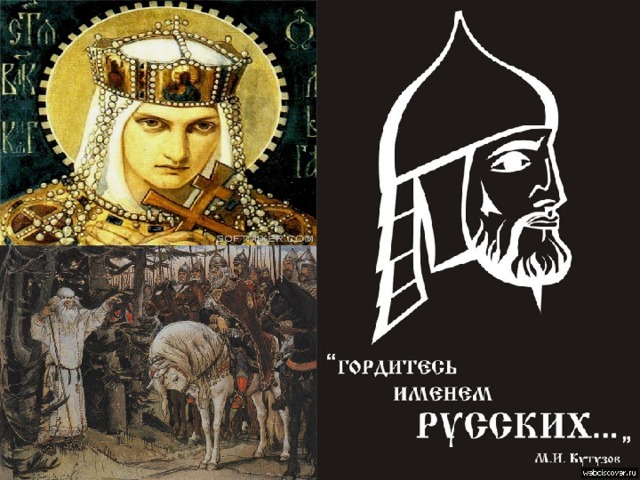
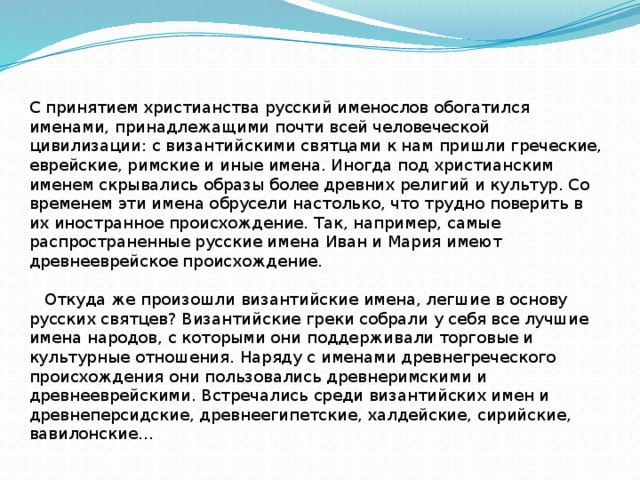
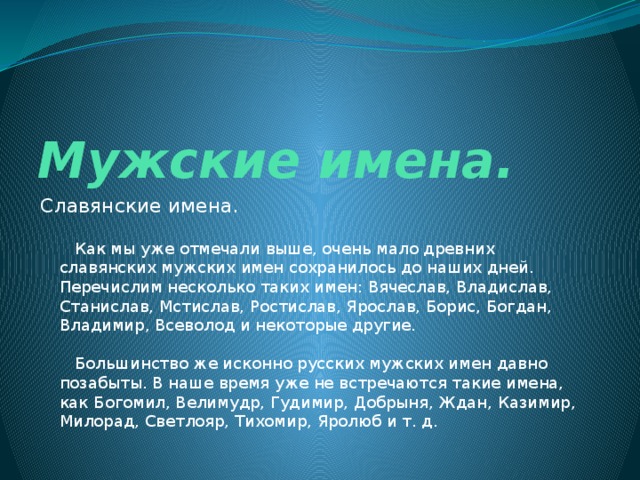
Men's names.
Slavic names.
As we noted above, very few ancient Slavic male names have survived to this day. We list several such names: Vyacheslav, Vladislav, Stanislav, Mstislav, Rostislav, Yaroslav, Boris, Bogdan, Vladimir, Vsevolod and some others. Most of the original Russian male names have long been forgotten. In our time, such names as Bogomil, Velimudr, Gudimir, Dobrynya, Zhdan, Kazimir, Milorad, Svetloyar, Tikhomir, Yarolyub, etc. are no longer found.
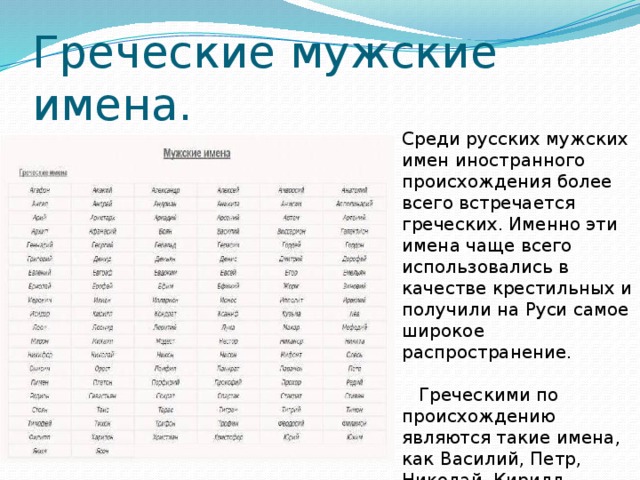
Greek male names.
Among Russian male names of foreign origin, Greek is most common. It is these names that were most often used as baptismal ones and received the widest distribution in Russia. Names of Greek origin are such as Vasily, Peter, Nikolai, Cyril, Fedor, Stepan.
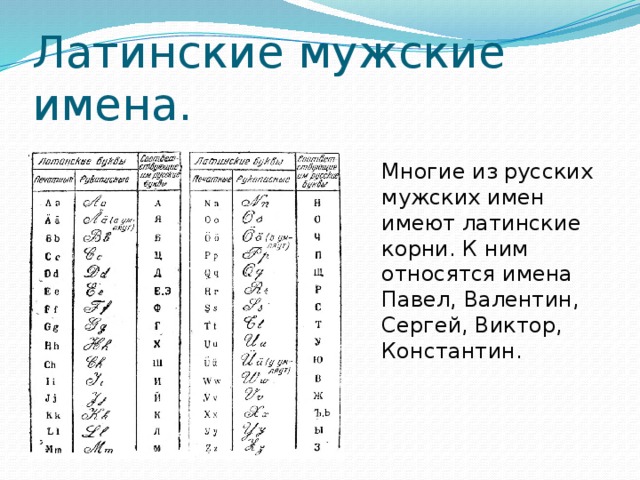
Latin male names.
Many of the Russian male names have Latin roots. These include the names of Pavel, Valentine, Sergey, Victor, Konstantin.
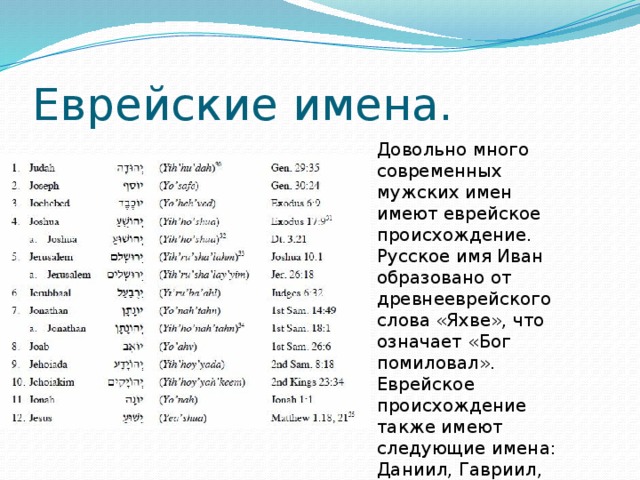
Jewish names.
Quite a few modern male names are of Jewish origin. The Russian name Ivan is derived from the Hebrew word "Yahweh", which means "God had mercy." The following names also have Jewish origin: Daniel, Gabriel, Zahar (Zachariah), Matvey, Saveliy, Benjamin.
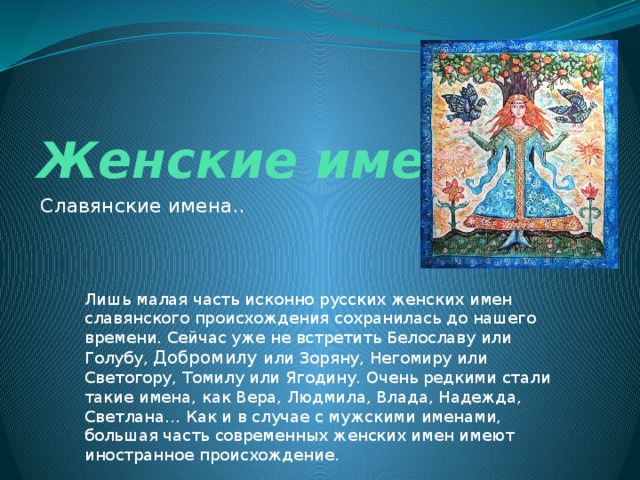
Women's names.
Slavic names ..
Only a small part of the original Russian female names of Slavic origin has survived to our time. It is now impossible to meet Beloslav or Golub, Dobromil or Zoryan, Negomir or Svetogor, Tomil or Yagodin. Such names as Vera, Lyudmila, Vlada, Nadezhda, Svetlana became very rare ... As in the case of male names, most of the modern female names are of foreign origin.
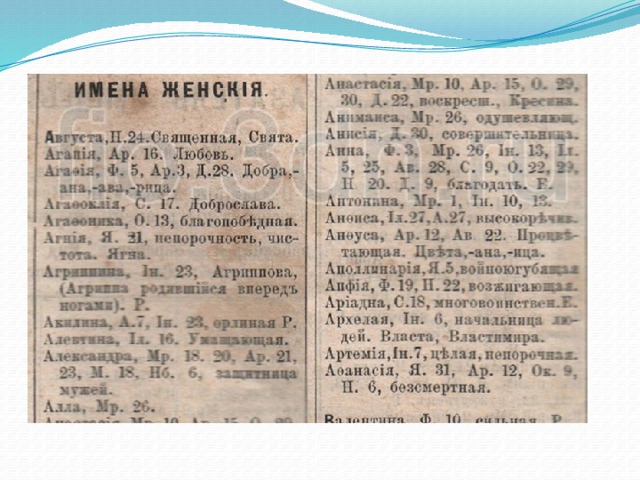
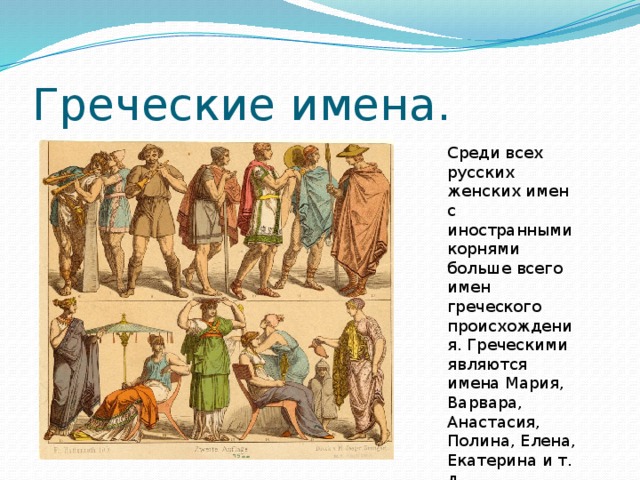
Greek names.
Among all Russian female names with foreign roots, the most names are of Greek origin. The Greek names are Mary, Barbara, Anastasia, Polina, Elena, Ekaterina, etc.
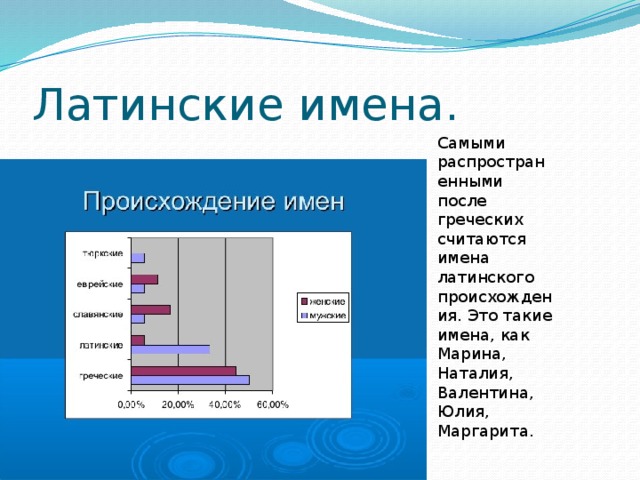
Latin names.
The most common after the Greek are names of Latin origin. These are names such as Marina, Natalia, Valentina, Julia, Margarita.
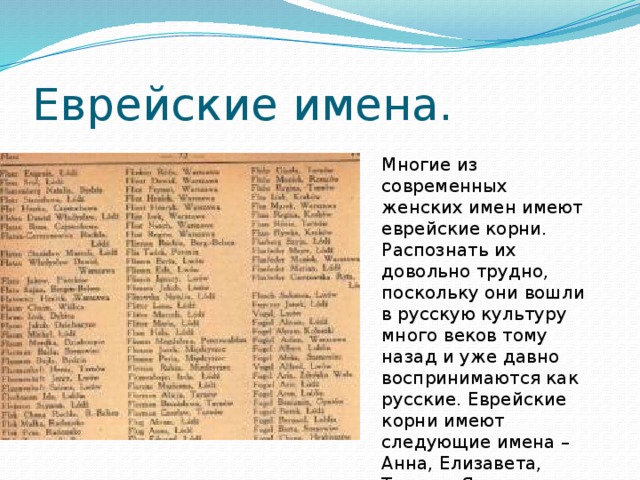
Jewish names.
Many of the modern female names have Jewish roots. It is rather difficult to recognize them, since they entered Russian culture many centuries ago and have long been perceived as Russian. Jewish roots have the following names - Anna, Elizabeth, Tamara, Yana.
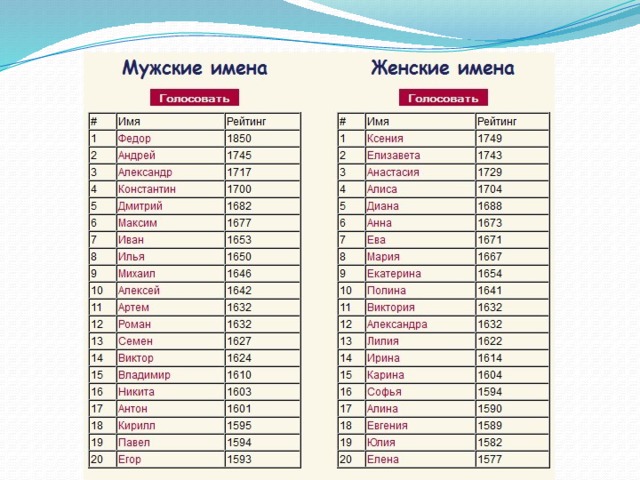
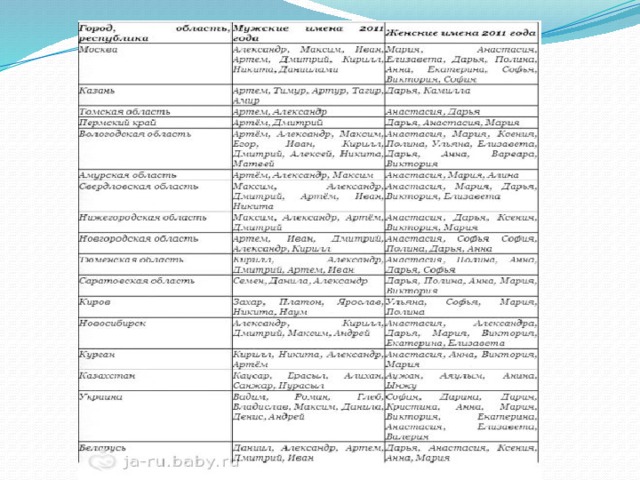
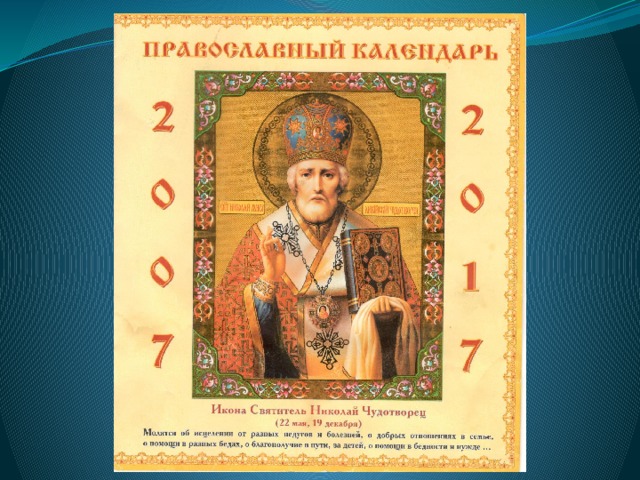
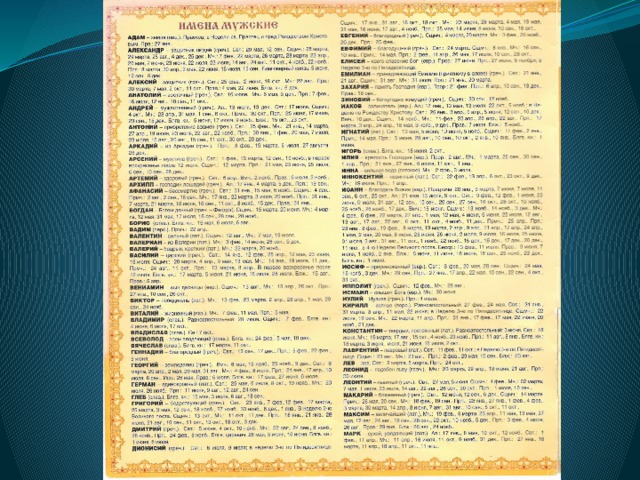
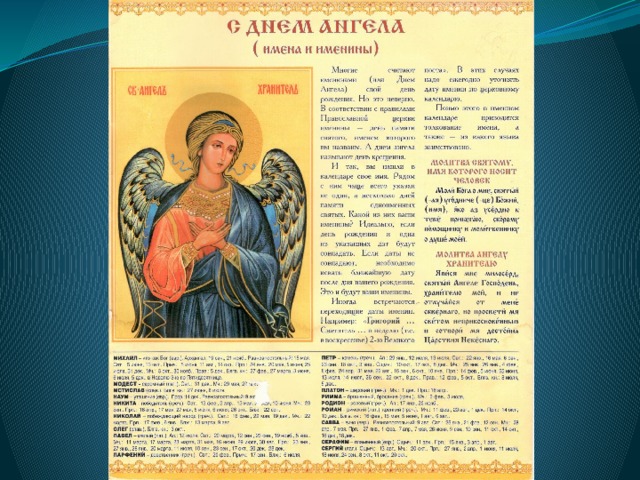
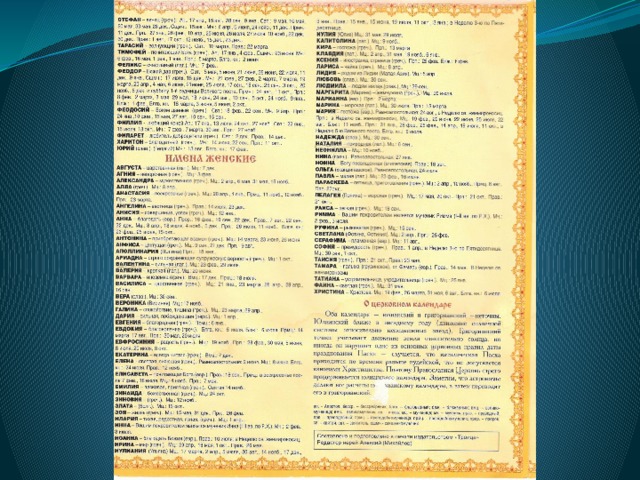
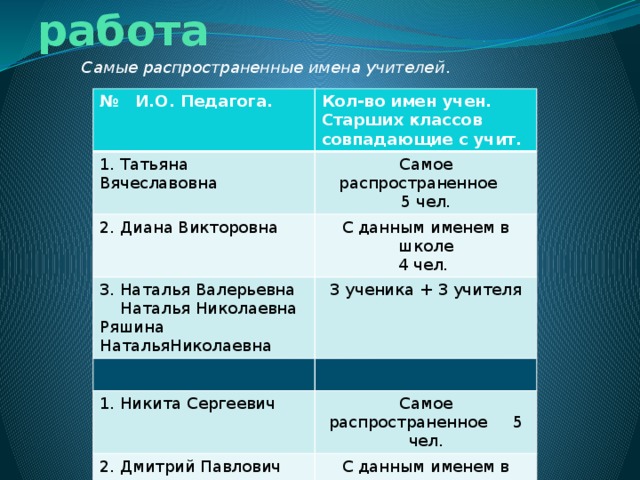
Research
The most common teacher names .
№ AND ABOUT. The teacher.
Number of names scientist. High school matched with teaches.
1. Tatyana Vyacheslavovna
Most common
2. Diana Viktorovna
With this name at school
3. Natalya Valerevna
3 students + 3 teachers
Natalya Nikolaevna
1. Nikita Sergeevich
Ryashina Natalya Nikolaevna
The most common 5 people.
2. Dmitry Pavlovich
With this name at school
3. Kirill Viktorovich
Andrey Alekseevich
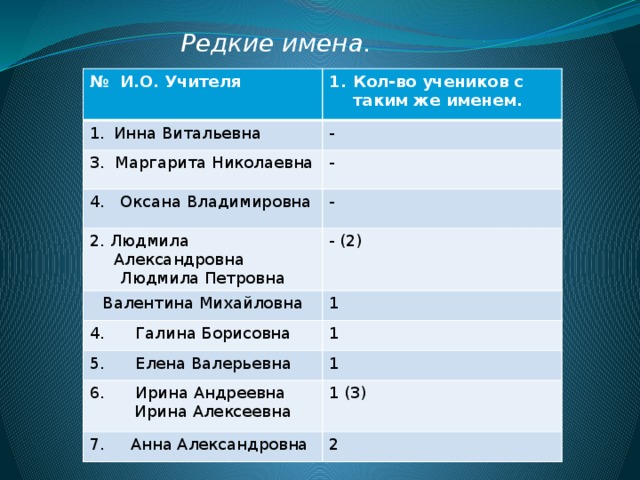
Rare names.
№ AND ABOUT. Teachers
- Inna Vitalievna
- Number of students with the same name.
3. Margarita Nikolaevna
4. Oksana Vladimirovna
2. Lyudmila Alexandrovna
Valentina Mikhailovna
Lyudmila Petrovna
4. Galina Borisovna
5. Elena Valerevna
6. Irina Andreevna
Irina Alekseevna
7. Anna Alexandrovna
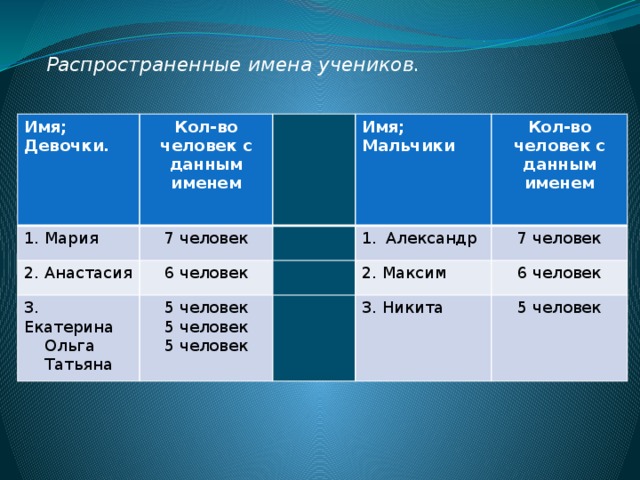
Common student names.
Girls.
2. Anastasia
7 people
6 persons
3. Catherine
The boys
- Alexander
Number of people with this name
5 persons
5 persons
7 people
6 persons
5 persons
5 persons
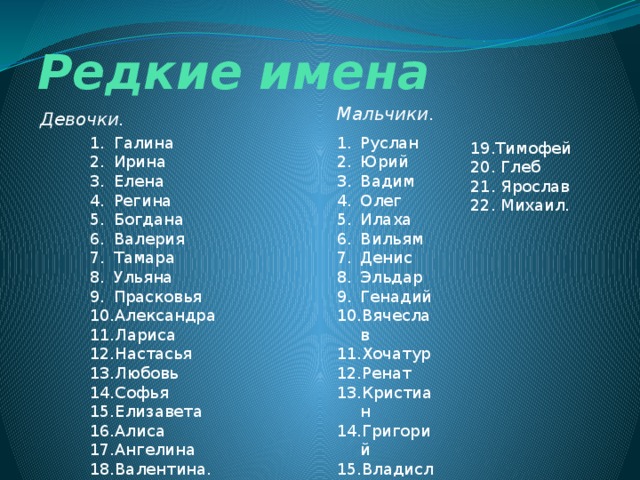
Rare names
The boys.
Girls.
- Galina
- Irina
- Helena
- Regina
- Bogdana
- Valeria
- Tamara
- Ulyana
- Praskovya
- Alexandra
- Larisa
- Nastasya
- Love
- Sophia
- Elizabeth
- Alice
- Angelina
- Valentine
- Ruslan
- Vadim
- Ilaha
- William
- Denis
- Eldar
- Genadiy
- Vyacheslav
- Hochatur
- Renat
- Christian
- Gregory
- Vladislav
- Vladimir
- Danila
- Timur
19.Timofei
21. Yaroslav
22. Michael.
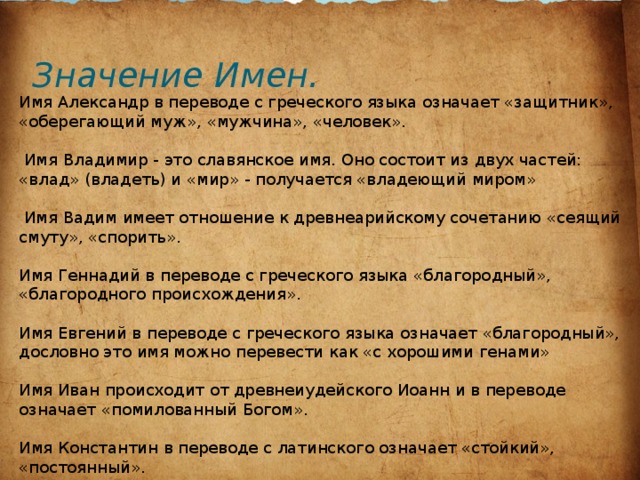
Meaning of Names.
The name Alexander, translated from Greek, means “protector”, “protecting husband”, “man”, “man”.
The name Vladimir is a Slavic name. It consists of two parts: "possess" (own) and "peace" - it turns out "owning the world"
The name Vadim is related to the ancient Aryan combination "sowing confusion", "to argue."
The name Gennady is translated from Greek as “noble”, “of noble origin”.
The name Eugene translated from Greek means “noble”, literally this name can be translated as “with good genes”
The name Ivan comes from the ancient Jewish John, and in translation means "mercy on God."
The name Konstantin in translation from Latin means “persistent”, “permanent”.
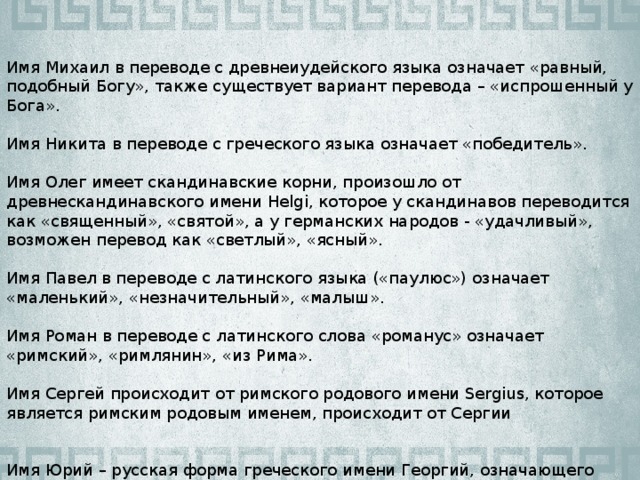
The name Michael in the translation from the ancient Hebrew language means "equal, similar to God," there is also a translation option - "requested from God."
The name Nikita in translation from Greek means "winner".
The name Oleg has Scandinavian roots, comes from the Old Norse name Helgi, which is translated as “sacred”, “holy” among the Scandinavians, and “successful” among the German peoples, the translation is possible as “bright”, “clear”.
The name Paul, translated from the Latin language (“Paulus”) means “small”, “insignificant”, “baby”.
The name Roman, translated from the Latin word "Romanus" means "Roman", "Roman", "from Rome."
The name Sergey comes from the Roman family name Sergius, which is the Roman family name, comes from Sergius
The name Yuri is the Russian form of the Greek name George, meaning "farmer"
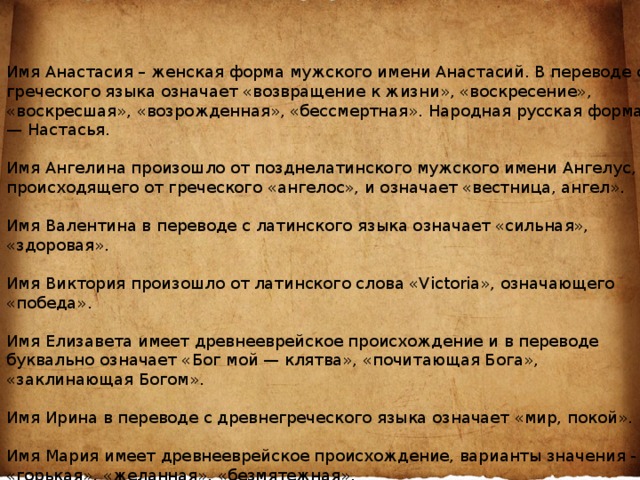
The name Anastasia is the female form of the male name Anastasia. Translated from the Greek language means “return to life”, “resurrection”, “resurrected”, “resurrected”, “immortal”. Folk Russian form - Nastasya.
The name Angelina comes from the late Latin male name Angelus, derived from the Greek "angelos", and means "messenger, angel."
The name Valentine, translated from Latin, means “strong”, “healthy”.
The name Victoria comes from the Latin word Victoria, meaning victory.
The name Elizabeth is of Hebrew origin and literally means “My God is an oath”, “worshiping God”, “conjuring God”.
The name Irina in translation from the ancient Greek language means "peace, peace."
The name Maria is of Hebrew origin, the meanings are “bitter,” “coveted,” “serene.”
The name Natalya is very ancient, it was formed in the first centuries of Christianity from the Latin "Natalis Domini", meaning "birth", "Christmas".
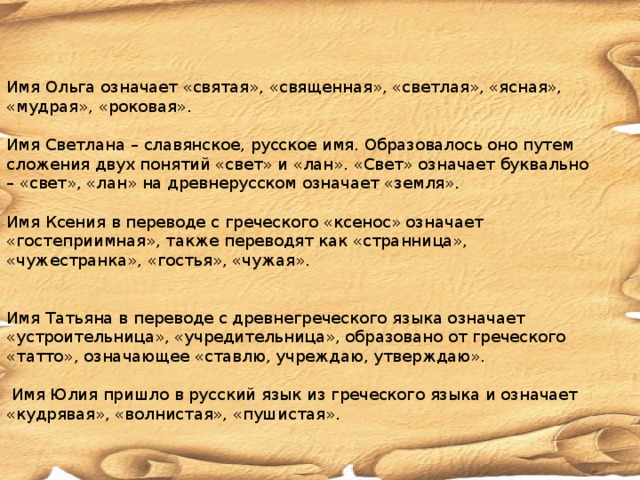
The name Olga means “holy”, “sacred”, “bright”, “clear”, “wise”, “fatal”.
Name Svetlana - Slavic, Russian name. It was formed by adding up the two concepts of "light" and "lan." "Light" means literally - "light", "lan" in Old Russian means "earth".
The name Xenia, translated from Greek, “xenos” means “hospitable”, also translated as “wanderer”, “stranger”, “guest”, “stranger”.
The name Tatyana in translation from the ancient Greek language means "organizer", "founder", formed from the Greek "tatto", meaning "I set, establish, affirm."
The name Julia came to the Russian language from the Greek language and means "curly", "wavy", "fluffy".
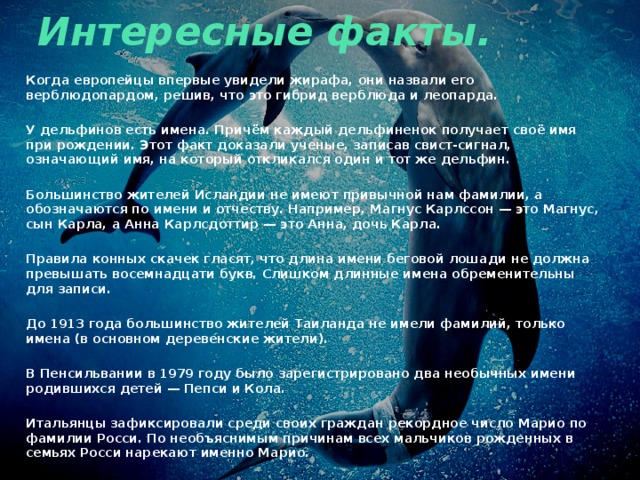
Interesting Facts.
When Europeans first saw a giraffe, they called it a camelopard, deciding that it was a hybrid of a camel and a leopard.
Dolphins have names. Moreover, each dolphin gets its name at birth. Scientists proved this fact by recording a whistle signal, meaning a name to which the same dolphin responded.
Most of the inhabitants of Iceland do not have the usual surname, but are designated by name and patronymic. For example, Magnus Karlsson is Magnus, the son of Karl, and Anna Karlsdottir is Anna, the daughter of Karl.
Horse racing rules state that the name of a running horse must not exceed eighteen letters. Names that are too long are burdensome to write.
Until 1913, most of the inhabitants of Thailand did not have surnames, only names (mainly villagers).
In Pennsylvania in 1979, two unusual names were born for children born - Pepsi and Cola.
The Italians recorded among their citizens a record number of Mario by the name of Rossi. For inexplicable reasons, all the boys born in Rossi's families are named exactly Mario.
In Hawaii, one of the schools in Honolulu received the youngest daughter of the owner of one of the local restaurants. Her first and last name consists of 102 letters. In Russian, her name means: "Numerous beautiful flowers of mountains and valleys begin to fill Hawaii in length and breadth with its fragrance." She couldn’t be included in the cool magazine :)
In America, approximately 2.5 people carry the surname Smith - this is the most popular surname in the United States.
More than ninety million Chinese people respond to Lee's surname, and for some Lee not only a surname, but also a name. Thanks to the fertility of the Chinese comrades, there are many more people with the surname Li than Ivanovs and Smiths combined.
After the revolution of 17 years, people wanted to reflect the era in the names of their children. Therefore, in the 1920s and 1930s, many new names appeared. Some of them have taken root: Kim (abbreviation: Communist International of Youth), Oktyabrina, Vladlen (from Vladimir Lenin). But not all names were successful. Many did not stand the test of time. Here are the rarest and most dissonant ones: Lagshmivar (Schmidt Camp in the Arctic), CAC (Central Pharmacy Warehouse), Persostratus (First Soviet Stratostat), the legendary Dazdraperma (Long live May Day).
The famous artist Pablo Picasso is known to everyone. But not everyone knows the full set of his name and surname. Pablo Diego Jose Francisco de Paula Juan Nepomukeno Crispin Crispiano de la Santisima Trinidad Ruiz and Picasso. In total, his name and surname are 93 letters. After all, Picasso is a Spaniard, and in Spain such a magnificent set of names is not uncommon.
The entrepreneur and philanthropist Savva Mamontov named his five children so that their initials were the name of his father: Sergey, Andrey, Vsevolod, Vera and Alexandra.
In 1958, New Yorker Robert Lane gave his next son the name Wiener (“winner”), and another three years later a son was born again, who received the name Luser (“loser”). Luser became a fairly successful person - he graduated from high school and college, enlisted in the police, where he became a detective and then a sergeant. Wiener, in turn, survived more than 30 arrests for petty offenses, eventually imprisoned for two years, and now lives in a shelter for the homeless.
Ancient Roman women did not have personal names. They received only a generic name, for example, Julia, if she was born in the genus Juliev. If there were several daughters in one family, ordinal prenomens were added to their family names: Second (second), Terzia (third), etc.
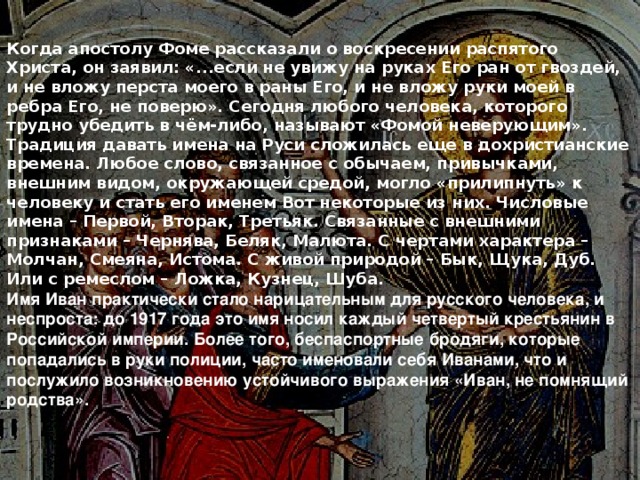
When they told the Apostle Thomas about the resurrection of the crucified Christ, he declared: "... if I do not see His wounds from nails in His hands, and I do not put my finger in His wounds, and I do not put my hands in His ribs, I will not believe." Today, any person who is difficult to convince of anything is called "Thomas an unbeliever."
The tradition of giving names in Russia has developed in pre-Christian times. Any word related to custom, habits, appearance, environment, could “stick” to a person and become his name. Here are some of them. Numerical names - First, Second, Tretiak. Associated with external signs - Chernyava, Belyak, Malyuta. With character traits - Molchan, Smeyana, Istoma. With wildlife - Bull, Pike, Oak. Or with a craft - a spoon, a blacksmith, a fur coat.
The name Ivan practically became a common noun for a Russian person, and for good reason: until 1917 every fourth peasant in the Russian Empire had this name. Moreover, passportless vagabonds who fell into the hands of the police often called themselves Ivanes, which served as the emergence of the stable expression "Ivan, who does not remember kinship."
Zemskov Konstantin
In this paper, various ways of the appearance of surnames in Russia are considered, and the student also tried to investigate the ways of the appearance of the names of his classmates.
Download:
Preview:
Municipal budgetary educational institution
"Secondary school number 32" of the city of Engels, Saratov region
Research
on this topic
"History of the emergence of Russian surnames
Fulfilled student 2 "G" class
MBOU secondary school No. 32, Engels
Saratov region
Zemskov Konstantin
Project Manager: S. Vituleva
2011-2012 academic year
- Introduction
- Main part
- The history of Russian surnames
- Methods of forming Russian surnames
- Conclusion
- Literature
- Applications
- INTRODUCTION
It is useful for each person to know their story, the history of the origin of the surname of their family, at least in order to better know themselves.
Not many people think about the origin of their surname. In the lesson of the surrounding world, we studied the topic “Family. Relatives ”and talked about how surnames, first names, patronymics appeared. I was wondering, but how did my last name come about? In search of an answer to the question, I became interested in the formation and decoding of surnames.
The purpose of my work wasdetermination of the ways of formation of my surname and surnames of classmates with their subsequent decoding and classification.
During the study, I solved the following tasks:
- definitions of concepts surname, hereditary name;
- the study of the history of names;
- work with literary and Internet sources;
- compiling a dictionary of surnames of classmates
- MAIN PART
2.1 History of the emergence of Russian surnames
In the history of mankind there was a time when people did not have surnames, this refers to the period until the second half of the 2nd millennium. But in order to distinguish between people, personal names were invented. However, it soon turned out that a personal name alone was not enough, because, despite the fact that the names were constantly invented and changed, there were still many repeating ones. And then they came up with nicknames. Over time, the composition and number of inhabitants increased, and then additional ways of naming people were already needed. People began to think more about the family continuity of generations, that each family needed some special detail that would be familiar to the whole family and would be inherited by descendants. So the first hereditary family names were formed, such is the history of the origin of the family name.
It is noteworthy thatsurname translated from Latin means family. But before, by the family was meant something else that was different from our modern ideas. Family was a collection of people, along with slaves and their owners. And only after a certain period of time, the family became a cell of society with its distinctive feature-surname.
The process of origin of a surname in world history began to gain strength from about the second half of the millennium, and towards the end of the 19th century, almost all nations and peoples already possessed them. Comparing the speed with which this process was going on in different parts of the globe, we note that generic names appeared at about the same time among different peoples, and the same methods of their formation were used. First of all, noblemen who had more privileges in comparison with other social strata became the owners of surnames. This was characteristic of Russia, and Europe, and Asia. Gradually, over the course of several centuries, the process of the origin of surnames and their distribution among other social groups went on until the whole population began to possess them.
Almost all surnames were not chosen by the carrier, but were given from the side. I concluded, looking at the people around me, that no one could be responsible for the surname obtained once by his ancestor. At present, there is no connection between a person and his name: Chernyshov can be a blond man, Rogues can be a very good person, Zlobin can be a good person, and Nekrasov can be a beautiful one. There was often no direct connection in the past: for example, the names or nicknames Tsar - Tsarev, Prince - Knyazev were usually given to peasants - apparently, in the hope of future power, wealth, and power. A fool, Nekras, Wretch, Malice could have called a child to protect him from the evil eye, to deceive evil forces that would harm a good baby and not touch a “bad” one. Many of the names that underlie modern surnames and seem offensive to us now were not considered so, but simply, having become a name, became an ordinary verbal sign.
Even those surnames that usually seem clear to us are fraught with riddles and surprises, so questions and doubts will lie in wait for us everywhere. There are interesting cases when the word seems to be known to everyone, but is used in a completely different meaning. So, the ancestor of Dvornikov was a janitor, but he did not clean the streets and courtyards, but was a tenant or landlord.
2.2 Methods of forming surnames
The historical process of the origin of a surname has several basic ways of their formation, moreover, the same for different peoples and nations:
1) from personal names (church and non-church);
In many modern surnames, forms of old names that once existed in Russia are traced: Nechay - Nechaev, Tretyak -
Tretyakov, Krivets - Krivtsov, Frost - Morozov. Frost - a non-Christian male name was given, as a rule, to a person born in cold, frosty weather. This name was not uncommon until the 17th century. These names reflected the various properties of people, their behavior, character, characteristics of speech, physical disabilities or virtues, the time and order of the appearance of the child in the family.
A large mass of surnames was formed from Christian names: Gordeev - canonical name Gordian, king; Fedoseev - Fedosiy given by God; Klimenko - Clementius, silent, condescending.
Modern Russian surnames have preserved many unofficial personal names of the past, among which there are long-forgotten or very rare in dialects. For example, the surnames Mamin, Mamkin are most often formed not from the word mother, but from the calendar names Mammy or Mamant; the name Mamant, and not the name of an extinct animal, dates back to the modern surname Mamontov. Martyshkin does not come from a monkey, but from a derivative form of the names Martyn, March.
2) by occupation (profession, craft);
Surnames can remind you of long and permanently forgotten professions: Berdnikov (Berdnik - craftsman making a reed - combs of looms),
Tolmachev (tolmach - translator). At the same time, professions served as the basis for the formation of a large number of surnames; Sapozhnikov, Kuznetsov, Kirpichnikov, Tabakov, Telyatnikov, Vorotnikov (the main one above the gate), etc.
3) from the name of the place of residence;
Many surnames have geographical roots. Most often, this is an indication of the place where the founder of the surname comes from. The ancestors of the Mezentsevs came from the banks of the Mezen River, Turintsevs - from the River Tura. Vyazemsky owned land on the Vyazma River. Peasants were recorded by the name of the landowner - Vyazemsky (Whose?).
There are surnames that reflect historical events. The Moscow prince, conquering the northern territories belonging to Novgorod, burned the town of Kokshengu, and destroyed most of the population. The descendants of the surviving and scattered inhabitants received the surname Koksharovs.
4) from the name of animals and plants;
The names of animals, birds, fish are one of the main sources of nicknames and surnames formed from them, as this is dictated by the cult of birds, animals from the ancient Slavs.
Seleznev (male duck), Voronin, Gusev, Gusakov (gander — male goose), Korostelkina (coriostel - a fast-running bird living in the grass). Surnames formed from mammals, insects, fish are also numerous: Beavers, Bychkov, Volkov, Ershov, Kozlov, Kobelev, Lisin
5) nicknamed.
Gorlov (a nickname characterizes the behavior of a person. This is the name of the person who screamed loudly, achieved his cry). Beeps (from the words beep, beep; nickname of every screamer). Golubtsov (Golubets is a forgotten caressing word of the same meaning as the modern “darling.” Actually, a darling is a diminutive not from “dove”, but from “stuffed cabbage”.
Surnames related to the appearance of a person: Gubin, Glazin, Glazunov (from the word eye, “big-eyed, who has bulging eyes”, as well as someone who likes to stare: rotozey, onlooker). Belyaev (“Not everyone who was named Belyay was white, but Chernyai or Chernyshi were black,” notes linguist A. M. Selishchev). Belyakov (nickname for blond, white-faced, white-haired people. But tidy people were also called tidy people. Also, the surname was connected and with serf reform: a bleached man, that is, a man freed from taxes). Ryzhakov, Chernov (one of the very common surnames that belonged to the first hundred Russian surnames. The surname is associated with a swarthy skin color, black hair, dark clothes.
In the Russian tradition, women at marriage usually take the name of the husband. However, this is not necessary, a woman can keep her maiden name. Sometimes, in rare cases, the husband may take his wife's surname. Children usually accept the father's last name, however, at the request of the parents or if the woman is not married, they can accept the mother's last name.
3. PRACTICAL PART
Dictionary of surnames of classmates
I will cite the names of my classmates as examples.
- Firstly, personal names are the most popular source of the origin of the surname. For instance:
Pavlov - on behalf of Paul, from Latin meaning "small";
Borisov - on behalf of Boris, translated from Bulgarian means wrestler;
Sashchenko - is of Ukrainian origin, the surname is based on the diminutive form of the name Sasha;
Trukhmanova - from the male name Trukhan - this is one of the variants of the name Tryphon;
Semenishchev - on behalf of Semyon, translated from Greek “hearing God”.
Trofimov - on behalf of Trofim, translated from Greek as “pet”.
The surname Erokhin came from church name Hierofei, translated from ancient Greek as “sacred,” also the surname Frolkin came from the form of Frol from the male church name Flor, translated from Latin “blooming”.
Daniltseva - from the Orthodox name Danil, which was quite widespread. This surname is of Russian origin.
- In addition to personal names, the sources of origin of the surnames were professions, crafts, various human occupations. For instance:
Bakharev - from the word Bahar, Bahir is a talker, narrator, storyteller;
Zemskov - from the village clerk - assistant to the headman under serfdom, who was sometimes called zemsky;
Sklyar in Belarusian and Ukrainian means glazier;
Skorobogatova is a derivative of the word fast-rich - quickly enriched.
Daniltseva - most often such surnames are formed from the profession of a distant ancestor.
- Another fairly common way of the origin of the surname was its origin from the name of the locality of residence of its carrier. In this case, the origin of the surname can be associated both with a geographical object, and with the names of these objects and the names of settlements. For instance:
The surname of Borisov may also come from the naming of a resident of the city of Borisov.
Kiselyova - from the geographical name, the village of Kiselyovo;
Zelenskaya - this surname is of Polish origin. All representatives of such families belonged to the Polish gentry. In 10%, the bearer of such a surname may be a descendant of the ancient Russian princely or boyar family. Zelensky - from villages named Zelenoe.
- The next source of the origin of the names was the names of animals and plants. For instance:
Sizov - from derivatives Sizyak-wild pigeon and Sizyov- "woodpecker".
- Another source of the origin of surnames in Russia was nicknames. Surnames-nicknames existed in Novgorod possessions from the 13-14 centuries, but for a long time were not common. Here are examples of surnames derived from nicknames:
Noodle-formed from the nickname Noodles, ascending to the common noodles - flour product;
The surname of Sizov has one more origin. In the Pskov and Tver dialects, “gray” had the meaning “pale, thin”. The surname of Kiselyov can still come from the nickname or non-church name of Kisely. Such names were given, according to the names of dishes that were popular in Russia.
Guskova - the surname is formed from the nickname Gus, Gusak.
Dyudina - this surname is of Turkic origin and came to us from the Arabic language. It is formed from the word "din", which means "religion, faith." People in the Upper Volga region were sometimes called grandfather.
4. CONCLUSION
I learned a lot of interesting and useful things, starting to study my own surname. Then he deciphered all the last names of the students of our class and concluded that the word last name means: family, family, family name, that any current name does not depend on its original purpose, it should not be ashamed, but rather it should be carefully carried through life and passed on to descendants. You need to love your last name.
Learning surnames is valuable to science. It allows you to more fully represent the historical events of recent centuries, as well as the history of science, literature and art. The history of a surname is a kind of living story. In the past, pedigrees were the property of only a handful of aristocrats. And the whole mass of the common people "did not expect ancestors." But now millions of people have the right to be proud of their ancestors, their work.
As a result of the study, my classmates and I learned about their surnames, the ancestors who gave them their surnames, the places where they lived, what they did, in which families they grew up.
5. LITERATURE
- E.N. Polyakova “From the History of Russian Names and Surnames” “Enlightenment” 1975
- A.V. Superanskaya, A.V.Suslova "Modern Russian surnames" "Science" 1984
- E.A. Grushko, Yu.M. Medvedev Encyclopedia of Russian Surnames EKSMO 2000
- THEM. Ganzhina "Dictionary of modern Russian surnames"
Astrel Publishing House 2000
6. APPLICATIONS
Profile
- Do you know the story of your last name?
A) yes
B) no
C) did not think
- Would you like to know the origin of your surname?
A) yes
B) no
C) I do not know
- What do you think can I find out by your last name?
__________________________________________________________________________________________________________________________________
Introduction
At birth, everyone
gets the last name from the parents,
middle name from father and name by which
they call him.
We poorly imagine ourselves without
your name. And others
it’s also difficult to do without names.
We could not contact friend
to a friend only with the words “hey you!”.
Each of us has a name, it
distinguishes a person from others
people.
The name is the first gift that
gets a newborn man,
barely born.
The origin of the word "name"
controversial, and according to one opinion
it originates from old Russian
“Have” or “count”
(be considered someone).
In the history of Russian names
Three main stages are distinguished:
1. The oldest period
2. The period of Christian names
3. The period after the separation of the church
from the state
In ancient times, names in Russia
looked like nicknames
data for one or another
about, for example:
by birth order:
Pervak, Vtorak, Tretiak,
Chetvertak, Elder
by appearance:
Chernysh, Belyak, Malusha, Kudryash
by nature and behavior:
Besson, Scream, Fun, Nesmeyana,
Dobrynya
by the “desirability” of appearance
child:
Bogdan, Nezhdan, Love, Goluba. Of great interest are
names associated with the animal and
plant world:
Wolf, Wheatgrass, Swan, Bull,
Nightingale, raspberries.
This is due to the belief in
the divinity of some
animals and plants.
Some - who may not believe in them
authenticity, think it is
nicknames. But it really is
the names of our ancestors. At the end of the X (tenth) century (988)
Prince Vladimir Krasnoe
The sun agreed
to the emperor of Byzantium (Greece) on
Baptism of Russia.
The rite of baptism was
that the inhabitants of Russian villages,
in droves drove into the river and
forced to rinse three times
wash your body with water
"Old pagan name and faith."
Standing at the time on the shore
christian priests
each was overshadowed by a cross and
gave a new name. Names that came with
Christianity were taken from
Eastern and European languages
peoples.
It was mostly
ancient greek names.
Christians have every day
is celebrated on
another saint.
And over time, custom developed
call children by names that
on the calendar stand close to the day
birthday or baptism day
a child.
The calendar itself is called
month, and among the people -
clergy.
So-called
baptismal names that
corresponded to the names of the saints.
However, some Slavic
the names were recognized by the church,
even though to the saints
they had no relationship.
This, for example, Yaroslav,
Mstislav, Rostislav, Svyatoslav,
Vyacheslav. Some names come from
other languages.
Greek:
Alex is a defender.
Andrey is courageous.
Artemy (Artem) - healthy,
unscathed.
Galina is quiet.
Yuri is a farmer.
Eugene is noble.
Elena is bright and clear.
Zoya is life.
Christina is a Christian.
Nikita is the winner.
Nikolai is the winner of the nations.
Peter is a stone.
Sophia is wise.
Tatyana is the lady.
Latin:
Albina is white.
Victor is the winner.
Maxim is the greatest.
Natalia is a native.
Roman - Roman, Roman.
Hebrew:
Anna is a mercy.
Maria is beloved, desired.
Tamara is a date palm.
It should be noted that
regarding origin
names and original meaning
some names among
there are no specialists yet
final and
generally accepted opinion. The third stage began after
revolution of 1917.
Before that, only pop could give
name the newborn, and argue with
father did not dare.
Now the Church is separated from
states and people got
the right to choose a name for
a child.
000In addition to names matching
that time (Coat of arms, Energy,
Oktyabrina), appeared very
unusual names consisting of
abbreviations of a few words:
Krasarma is a red army.
Donara is the daughter of the people.
Vladilena - Vladimir Lenin.
Marlene - Marx and Lenin.
Vilen - Vladimir Ilyich Lenin.
Renat - revolution, science, labor.
Vilorik - V.I. Lenin -
organizer of workers and peasants.
Lucie is part of the word
"revolution".
Ninel - the word Lenin,
read right to left.
Lorieks - Lenin, October
revolution, industrialization,
electrification,
collectivization, socialism.
Lorikerik - Lenin, October
revolution, industrialization,
collectivization,
electrification, radio and
communism.
But this hobby quickly went
to decline and after 10-15 years
children began to give old
familiar names. Nowadays, they entered the Russian language
many foreign names:
Jeanne, Inessa, Edward, Timur,
Violetta, Elvira, Regina,
Albert, Herman, Mark and others. Interesting Facts
Most common name in
the world - Muhammad.
The most popular in the world
the female name is Anna.
It is worn by almost 100 million
women.
In Russia in the XII (twelfth) century
noble women often
were named after the father:
Yaroslavna, Svyatoslavna.
Almost all female names in Russia
end in A.
In Russian society, from 40 to 80
male names, and from 60 to 120
women’s.
The longest name in the world
consists of 1478 letters.
To read it, you do not need
less than ten minutes. The name Ivan came to us from
Greek language - John.
And in the Greek language the name came from
Hebrew Johanan.
It can be translated as "God
favors. "
The Russian name Ivan around
the world is scattered
relatives:
English - John
German - Johann,
French - Jean
Italian - Giovanni,
Swedish - Johan,
Danish - Jens,
Spanish - Juan.
Names in Russian. Name history
Three stages are distinguished in the history of Russian names: pre-Christian with original names, the period after the baptism of Russia, and the stage that began during the years of the revolution. Now we can talk about a new stage - there is a mixture of foreign names, Christian, Slavic and new names appear. In addition, it makes sense to mention the revival of the tradition of various nicknames. A striking example of this was the Internet.
Russian personal name - a name that is assigned to a person at birth and by which he is known in society.
In the pre-Christian era, that is, almost until the end of the 10th century, among the Eastern Slavs (the ancestors of modern Russians, Ukrainians and Belarusians), only personal names were used that were given to children at birth.
The princes were characterized by Slavic names consisting of two roots, foundations: Svyatoslav, Vsevolod, Rostislav, Miloslav, Mechislav, Ratibor, Yaropolk, Svyatopolk, Yaroslav, Vyacheslav, Vladimir and others. Slavic names of warriors, peasants, townspeople had one basis: Dobrynya , Proud, Embroidered, etc.
Names were nicknames given for one reason or another.
Nicknames were varied:
By seniority of birth: Pervak, First, Chetvertak, Semak.
By hair color: Black, Duck, Belyay, etc.
According to other external signs: Dry, Long, Malyuta, Bespaly, Loban.
By nature: Besson, Fun, Istom, Molchan, Nesmeyana.
Desire / unwillingness of the birth: Bogdan, Bapzhen, (welcome, dear), Love, Lyubava, Zhdan, Nechay, Milava, Pozdey, etc.
By time of birth: Veshnyak, Frost.
There were bad names that were endowed with the ability to avert evil spirits: Goryain, Nemil, Nekras, Anger, Tugarin (tuga - sadness)
Related to flora or fauna: Wolf, Cat, Wheatgrass.
Intra-family names were sometimes replaced by nicknames obtained during life: Dobrava, Smith, Mordvin, Spoon.
Some names were borrowed from the Western Slavs (Yaroslav, Mstislav) and the Varangians (Igor, Oleg, Rurik). Among the old Russian names there were also those that have survived to our days: Vadim, Vsevolod, Igor, Oleg, Yaroslav.
The names Bazhen, Besson, Bogdan, Bull, Veshnyak, Warrior, Raven, Second, Gnevash, Head, Dobrynya, Kurbat, Loban, Lyubim, Molchan, Rusin, Neklyud, Putilo, Rusin, Tomilo, Ushak, Yaroslav and others were widespread.
These names were kept until the 16th century.
After the introduction of Christianity, church names entered. Canonical and non-canonical names were distinguished.
Canonical name - a person’s name, enshrined in the traditions of the Christian religion. In domestic sources, the canonical ones usually include Orthodox names taken from the church calendar, where the names of the canonized saints are listed according to the months and days of their memory (the so-called calendar, or hagiographic names). In the early stages of the development of feudal society, as a rule, only godparents (baptismal, ecclesiastical), monastic, (monastic) and schematic names were canonical.
They were given according to church calendars. . Most of them are of Jewish or Greek origin, as they are borrowed from the Bible or came from Byzantium. In the Russian language, the most common of them changed their sound, adapting to the Russian pronunciation: James - Jacob, Joseph - Osip, John - Ivan, etc.
The history of Russian calendar names reflects the interaction of the Russian language with Church Slavonic, which led to the emergence of numerous transformations of personal names.
Christian names were the names of saints, as a rule, in the homeland of this saint they have semantic meaning.
During the adoption of Christianity, the rite of baptism was accompanied by the naming of a new name, the lists of which were transmitted by the Christian Byzantine church.
Baptismal the name was given to a person at baptism. It was often chosen by the priest from the church calendar in accordance with the name of the saint, whose memory was celebrated on the person’s birthday or baptism. The baptismal name is rarely mentioned in early sources, usually only in messages about the death of a given person or in texts written after his death. Perhaps this was due to superstitious ideas about the need to hide the "true" name that connected a person with a heavenly patron, patron, guardian angel in order to protect his bearer from "damage", "evil eye".
It is important to emphasize that in Russia there was a custom to give children names (both pagan and baptismal) in honor of their grandfather or grandmother, which emphasized (especially before the appearance of surnames) belonging to this genus.
Monasticthe name was the second canonical name that a person received when tonsured a monk. It replaced his former worldly name. Usually the tonsured received the name of the saint whose memory was marked on the day of the tonsure, or a calendar name that began with the same letter as the Minsk name of a monk or nun.
Schematicthe name was given to the monk at the "third baptism" (the adoption of the great schema) instead of his monastic name. It was also given to Moscow tsars and boyars, many of whom, according to tradition, accepted the schema before death (which ensured them being ranked as angelic). Often the schemniks, and sometimes the monks, were given calendar names that were rarely used in the world as baptismal ones (Sakerdon, Melchizedek, Akepsy; Syncliticia, Golindukha, Christodule, etc.)
NoncanonicalThe (worldly) name was not usually associated with religious traditions. It was the second, optional name of a secular man. In ancient Russia, the secular name, as a rule, served as the main name, since it was more famous and common than the true name. At first, it is a non-calendar, pre-Christian name that is not associated with the name of any saint. It, as a rule, had an “internal” meaning and should have endowed its carrier with some qualities that were useful in life. Later, in the same quality, along with pagan, Christian names begin to be used, usually in their folk, colloquial, non-canonical forms, for example, Mikola and Mikula instead of the canonical form Nikolai, Mikita instead of Nikita, Gurga, Nefed instead of Methodius, Nero instead of Miron.
Nicknames, unlike names, they always reflect not desirable, but real properties and qualities, territorial or ethnic origin, the place of residence of their carriers and thus indicate the special meaning that these properties and qualities had for others. Nicknames could be given to people at different periods of their lives and were known to a fairly limited circle of people.
Nicknames should be distinguished from pagan Old Russian names. However, such a difference is not always easy to establish. This is due, in particular, to the custom of giving children names derived from ethnonyms, names of animals, plants, fabrics and other objects, “protective” names. Many of these names sound insulting and therefore can be perceived by modern people as nicknames. For example, even among the nobles of the XVI century. there are the names Chudin, Kozarin, Rusin, Cheremisin, Mare, Shevlyaga (Nag), Cat, Goat, Beast, Sedge, Zhyto, Velvet, Shovel, Chobot, Neustroy, Nezvan, Dislike, Tat, Erysipelas, etc. Many of these nicknames existed in separate families for several generations, thereby emphasizing the person’s belonging to this genus. They were often used in official documents along with non-calendar names.
An important clarifying part of a person’s name in Russia was and remains about_t_ch_e_s_t_v_o (a patronymic nickname), usually used together with personal names and formed on behalf of his father. Patronymic directly indicated the origin and family ties of the person. Along with the names traditional for a given family, it was one of the most important "external" indicators of a person's belonging to a particular genus (in any case, before the names appeared).
At the same time, in ancient times in Russia, the middle name indirectly indicated the social belonging of a person, since it was considered an honorary name. While representatives of the higher nobility were called the so-called full patronymic ending in -wich, the middle estates used less honorable forms of patronymic ending in -ov, -ev, -in, and the lower did without patronymics.
Names, patronymics and nicknames have been known since ancient times, last namesthey appeared in Russia quite late. Surnames are inherited official names indicating that a person belongs to a particular family. As we have already noted, for several centuries the "tribal memory" in Russia has completely cost two generations of relatives: fathers and children. This was reflected in the author’s unconscious source of increased (compared with other terms of kinship) frequency of mentions of brothers on the one hand, fathers and mothers on the other. This is also confirmed by the fact that naming a person with a paternal nickname as a clan was considered quite sufficient, and therefore the so-called dedicism (personal nicknames formed on behalf of the grandfather) was used extremely rarely. Now it took a more “deep” lineage, fixed in clan nicknames common to all family members. They appeared only in the XV-XVI centuries, and even then at first only among the feudal lords.
Particular attention should be paid to female non-canonical names. They are almost unknown to us. There are even a number of names that cannot be unambiguously attributed to the number of female or male.
Women are rarely mentioned in chronicles. For example, in the "Tale of Bygone Years" messages related to the fair sex are five times less than "male". Some researchers even try to argue that in the old days women did not have personal names at all, which, in our opinion, is rather stupid. Before marriage, the girl was often called by her father, but not in the form of a patronymic, but in the possessive form: "Volodymerya", and after marriage - by her husband (in the same as in the first case "possessive", "possessive" form; cf. turnover: "husband", that is, "belonging to the husband"). Perhaps the only exception to the rule was the mention of the wife of Prince Igor Novgorod-Seversky in “The Tale of Igor's Campaign” - Yaroslavna.
The adoption of new names was slow. Most up to the XVII century. had two names.
But with the adoption of Christianity, the Slavs often had two names. “Real” is given at baptism (Jewish and Greek names), and secular - “from the evil eye”: pagan nickname, Scandinavian or West Slavic name. Moreover, in a person’s life they called it a "fake" name. And many did not remember that Prince Vladimir the Red Sun was actually Vasily, Yaroslav the Wise - Yuri (George), and Vsevolod the Big Nest was called Dmitry.
At the same time, a number of pagan, non-calendar names of secular and religious figures of the Russian Middle Ages, canonized by the Orthodox Church, moved into the category of calendar names (for example, Gleb, Boris, Vladimir, Olga, etc.). Some ancient Russian names are preserved in use to this day.
When used, the names often changed the pronunciation and spelling - It was Damian, Cyprian - became Demian, Kuprian.
During the XII - XIV centuries. assimilation of names was in progress. Most of the borrowed names took their final form by the fourteenth century.
In the official records, names have been preserved, consisting of two components: Semyon Koshka, Ivan Ring.
Many names had three options: ecclesiastical, literary, colloquial: Ioanicus - Anicius - Anikei, Anika.
In the XVII century. Patriarch Nikon conducting church reform has also changed the spelling of church names. As a result, a single name was stratified on informal forms.
For example, the name George came into use only in the XVII century. and not everywhere, while its forms were Yuri, Yegor, Yegoriy.
The double names and discrepancies of the spellings began to disappear when under Peter the Great in business papers they began to demand the full spelling of a name that coincides in form and spelling with the church ones (with the exception of Ivan, Yegor, Osip, Avdotya and others where the form is far removed from the original).
At the end of the XIX century. the Russian church undertook a revision of the holy calendar to eliminate the discrepancies that existed in the spelling of names.
In 1891, a month was published, which the Synod distributed to Orthodox parishes. It included more than 900 male and more than 250 female names (in the old - 330 male and 64 female).
They contained many names we are not familiar with now: Marianne, Severin, Eulalia, etc.
Most of the names are still known: Alexander, Andrey, Arseny, Aristarchus, Athanasius, Vasily, Gabriel, George, German, Gregory, Illarion, Irakliy, Konstantin, Leo, Leonty, Maxim, Mark, Mikhail, Nikita, Pavel, Peter, Roman, Timothy , Trofim, Philip, Jacob, women - Anastasia, Anna, Varvara, Vasilisa, Vera, Eugenia, Evdokia, Elena, Zoya, Irina, Katerina, Love, Maria, Nadezhda, Sofia, Taiana.
The third stage began with the publication in 1918 of the SNK Decree on the separation of the church from the state.
Since that time, foreign names have been included in the name line: Jeanne, Inessa, Eduard, Timur, Marat.
New “Russian” names appeared that arose during the years of the revolution and after.
New names were in fashion for newborns, reflecting the spirit of the revolutionary era. In the registry offices hung recommendation lists with the names: Horace, Zhores, Cromwell, Ampere, Industry, Volt, Volga, Eurasia, Volya, Duma, Science, Party, Commissioner, National, Tribun, Chemistry, Oktyabrina, Spark, Idea, Rem, Velior - “The Great October Revolution”, Velira - “The GREAT WORKER”, Vilen - “V.I. LENIN”, Vladlen - “VLADimir LENin”, Dazdraperma - “YES GREETING ON THE FIRST MAY!”, Dalis - “Long live Lenin And Stalin,” Kim - "Communist International of Youth", Leninid - "LENIN IDEAS", Leninir - "LENIN and the Revolution", Marlene - "MARx, LENin", Ninel - "Lenin (backward front) ", Rem -" World Revolution ", Rome -" Revolution And Peace ", Rem -" Revolution, Engels, Marx ".
However, fortunately, this hobby came to naught, and from the 40s normal names came into use.
Also, some names were borrowed from friendly countries and from the peoples of the USSR: Ioannina, Stanislav.
According to research in the 80s, the names were widely distributed: Alexander, Alexey, Andrey, Dmitry, Sergey, Anna, Ekaterina, Elena, Irina, Maria, Natalya, Olga, Tatyana, Julia.
Now there is a new wave. More and more parents call children rare ancient names, slavic namesjust unusual.
The shortest names: Oia, Leo, Ada, Eve, Zoe, Gleb, Mark, Peter.
Long: Apollinaria, Anastasia, Catherine, Maximilian.
Male and female names are different.
In the modern language, as a rule, male names end in solid consonant or in -th, female names in -a, -th.
There used to be about forty male names on -a, now there are only a few names - Nikita, Ilya.
The remaining names on -a, -i either went into the category of female names (Aza, Zina, Inna), or lost their endings: Artyom - Artyom.
The names in -ov, -ik, -ok are not used - they are similar to last names or adjectives.
Names in -in are rarely used - Martin, Peacock, Constantine.
Previously, there were a lot of paired names - Anastasiy-Anastasia, Antonin-Antonina, Kir-Kira, Marine-Marina, Natalia-Natalia.
Some names were toponyms - Lydia, Ellina, Nile.
The sources were the book Suslova A.V., Superanskaya A.V. On Russian names. Lenizdat, 1991. There were a couple more books, but I lost the data (((

